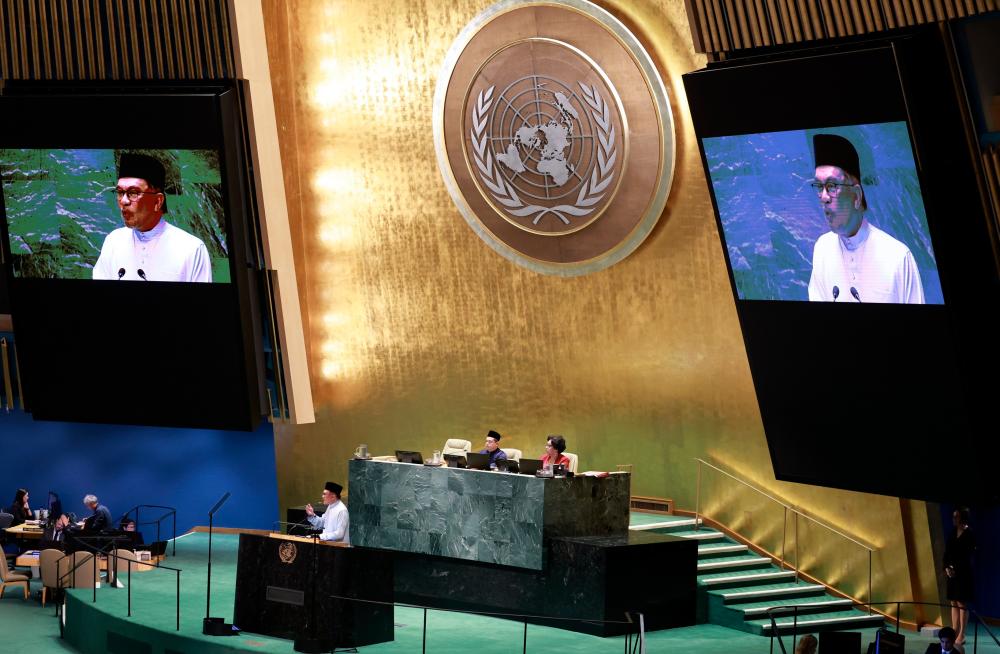PRIME Minister Datuk Seri Anwar Ibrahim’s eloquent speech on Sept 22 at the 78th session of the Annual United Nations General Assembly (UNGA) was in a class of its own.
In tone, style and content, he struck all the right chords, addressing regional, world and transnational issues, such as global warming, as well as the disenfranchisement and marginalisation of the poor.
He began in formal Malay except for the traditional Islamic greetings before switching to English for his speech proper.
His attire of Baju Melayu with samping and songkok in understated colours was simple yet elegant. The UNGA is not the place to display your colourful costume, exotic culture or quaint language but to share with others your visions and aspirations for a better world.
This, Anwar did brilliantly. His predecessors too have all addressed the UNGA but none matched Anwar’s superb performance.
Anwar’s first applause came when he, in unequivocal language, condemned Russia’s invasion of Ukraine. His critics back home perceived this as him trying to align with the US.
Yes, Anwar’s statement pleased the West, the US in particular. However, if his detractors had listened further, Anwar also condemned Israel’s annexation of Palestine and its actions of terrorising the Palestinians. That drew a louder applause.
Anwar is correct to support Ukraine. Malaysia, like Ukraine, also has powerful neighbours and has been invaded by one. Only former Indonesian president Sukarno’s ineptness and corruption made the 1960s konfrontasi fail.
Malaysia now has an even more powerful neighbour – China. Unlike Indonesia, our border with China is not terrestrial but maritime, in the now-contested South China Sea. As such, it is more difficult to define and defend.
China is flexing its naval muscles with its so-called “Nine-dash Line” claim. This reliance on mouldy documents to exert territorial claim is as old as humankind or, at least, written documents. It would not be the first time that wars would be started based on such purported deeds.
Anwar drew enthusiastic applauses when he condemned the recent spate of Quran burning in Sweden and when he voiced the plight of the poor. As for the former, hatred and intolerance are just that. Hiding behind the façade of freedom of expression is but a perversion of enlightened values.
Anwar reiterated the Swedish Quran burning incident later in a Friday khutba (sermon) at the Islamic Cultural Centre in New York.
Here again, Anwar’s genius in reading his audience was on clear display. He related his Madani government’s response, translating the Quran into Scandinavian languages for free distribution.
Counter-intuitive, as with literally throwing fuel (or paper in this case) into the fire. However, as Anwar so eloquently elaborated in his khutba, only ilm (knowledge) and hikmah (wisdom) can win over evil and ignorance.
Anwar’s informal session with the local Malaysian students was refreshingly candid. Together with their probing questions and Anwar’s substantive responses, that encounter brings home the value of sending Malaysians to great American colleges instead of the usual Creekville State universities or Third World institutions.
In the epigraph to his biography of the Prophet Muhammad: Man and Prophet, Saudi writer Adil Salahi quoted the advice his father gave him. “Loving Prophet Muhammad could only be demonstrated by following his teachings, not by singing his praises.”
In being eloquent as a secular leader, as he did in addressing the UNGA and a few hours later as a spiritual one with his khutba, Anwar emulates our great Prophet in blending affairs, mualamat (secular) with ibadat (spiritual).
May Allah continue guiding Anwar to lead Malaysia to a better, peaceful and prosperous future.
M. Bakri Musa









